Analysis of the Contemporary Hospitality Industry: Travelodge Report
VerifiedAdded on 2023/02/02
|12
|4012
|28
Report
AI Summary
This report provides a comprehensive analysis of the Travelodge hotel chain within the contemporary hospitality industry. It begins with an introduction and company overview, highlighting Travelodge's position as a leading budget hotel chain in the UK. The report then delves into various aspects of the industry, including the different services offered, the interrelationships between functional departments, and the impact of the hospitality industry on the economy. It examines operational roles, required skills, and their impact on performance, addressing skill shortages and gaps. The analysis extends to external factors influencing hotel performance, utilizing PESTELE and SWOT analyses. Finally, the report explores the implications of current and potential trends in the hospitality sector and suggests specific areas for product and service development, concluding with a summary of key findings and a list of references.
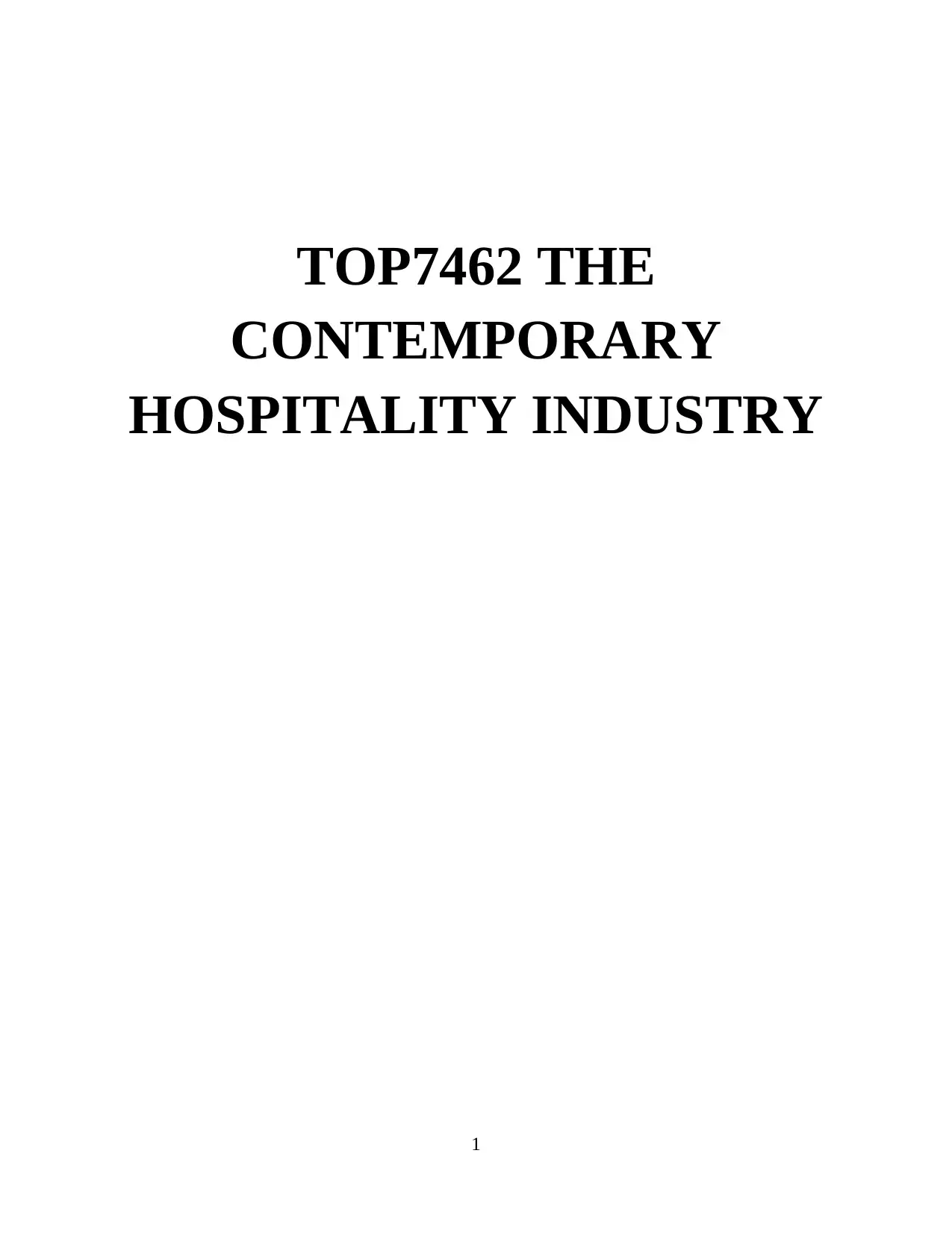
TOP7462 THE
CONTEMPORARY
HOSPITALITY INDUSTRY
1
CONTEMPORARY
HOSPITALITY INDUSTRY
1
Paraphrase This Document
Need a fresh take? Get an instant paraphrase of this document with our AI Paraphraser
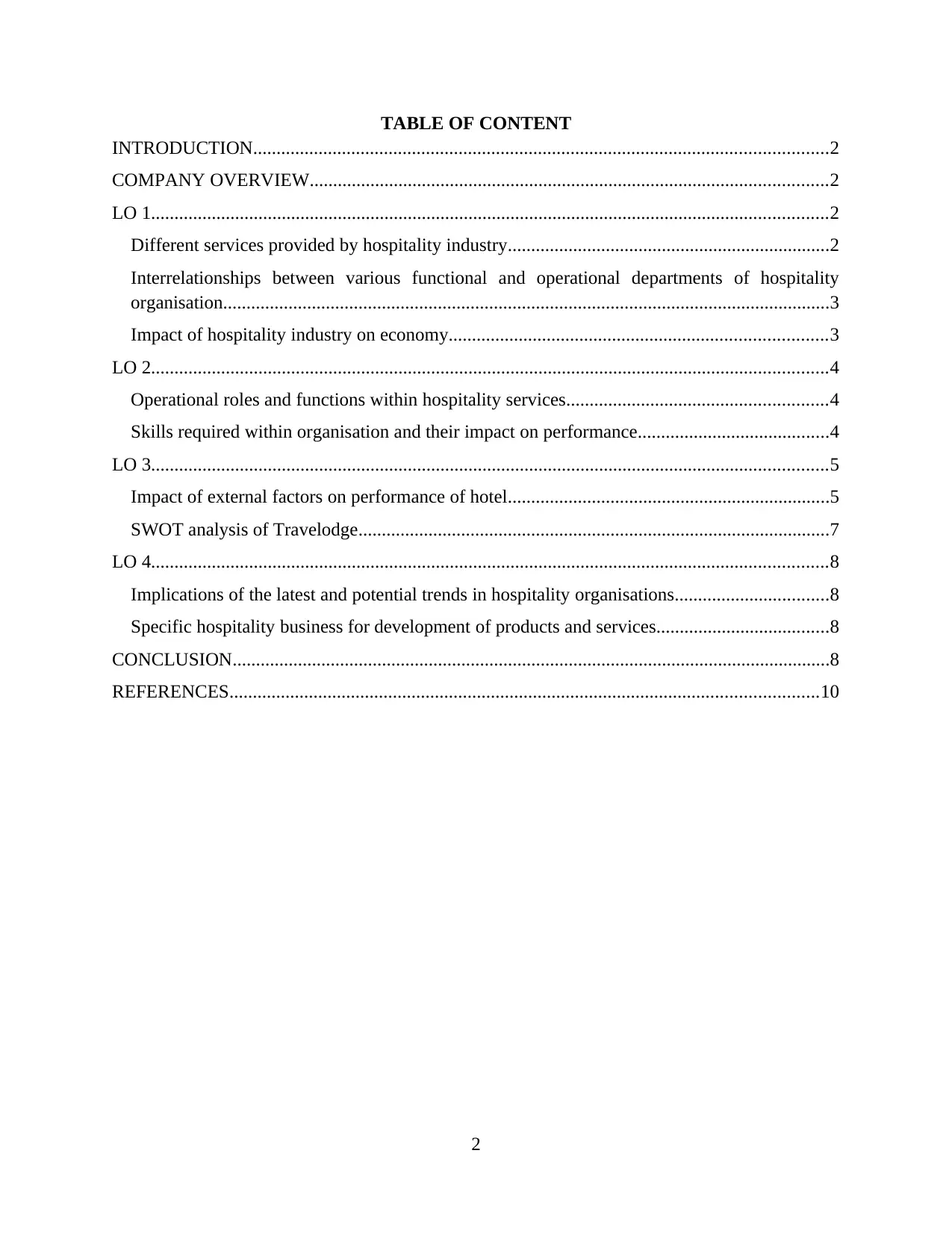
TABLE OF CONTENT
INTRODUCTION...........................................................................................................................2
COMPANY OVERVIEW...............................................................................................................2
LO 1.................................................................................................................................................2
Different services provided by hospitality industry.....................................................................2
Interrelationships between various functional and operational departments of hospitality
organisation..................................................................................................................................3
Impact of hospitality industry on economy.................................................................................3
LO 2.................................................................................................................................................4
Operational roles and functions within hospitality services........................................................4
Skills required within organisation and their impact on performance.........................................4
LO 3.................................................................................................................................................5
Impact of external factors on performance of hotel.....................................................................5
SWOT analysis of Travelodge.....................................................................................................7
LO 4.................................................................................................................................................8
Implications of the latest and potential trends in hospitality organisations.................................8
Specific hospitality business for development of products and services.....................................8
CONCLUSION................................................................................................................................8
REFERENCES..............................................................................................................................10
2
INTRODUCTION...........................................................................................................................2
COMPANY OVERVIEW...............................................................................................................2
LO 1.................................................................................................................................................2
Different services provided by hospitality industry.....................................................................2
Interrelationships between various functional and operational departments of hospitality
organisation..................................................................................................................................3
Impact of hospitality industry on economy.................................................................................3
LO 2.................................................................................................................................................4
Operational roles and functions within hospitality services........................................................4
Skills required within organisation and their impact on performance.........................................4
LO 3.................................................................................................................................................5
Impact of external factors on performance of hotel.....................................................................5
SWOT analysis of Travelodge.....................................................................................................7
LO 4.................................................................................................................................................8
Implications of the latest and potential trends in hospitality organisations.................................8
Specific hospitality business for development of products and services.....................................8
CONCLUSION................................................................................................................................8
REFERENCES..............................................................................................................................10
2
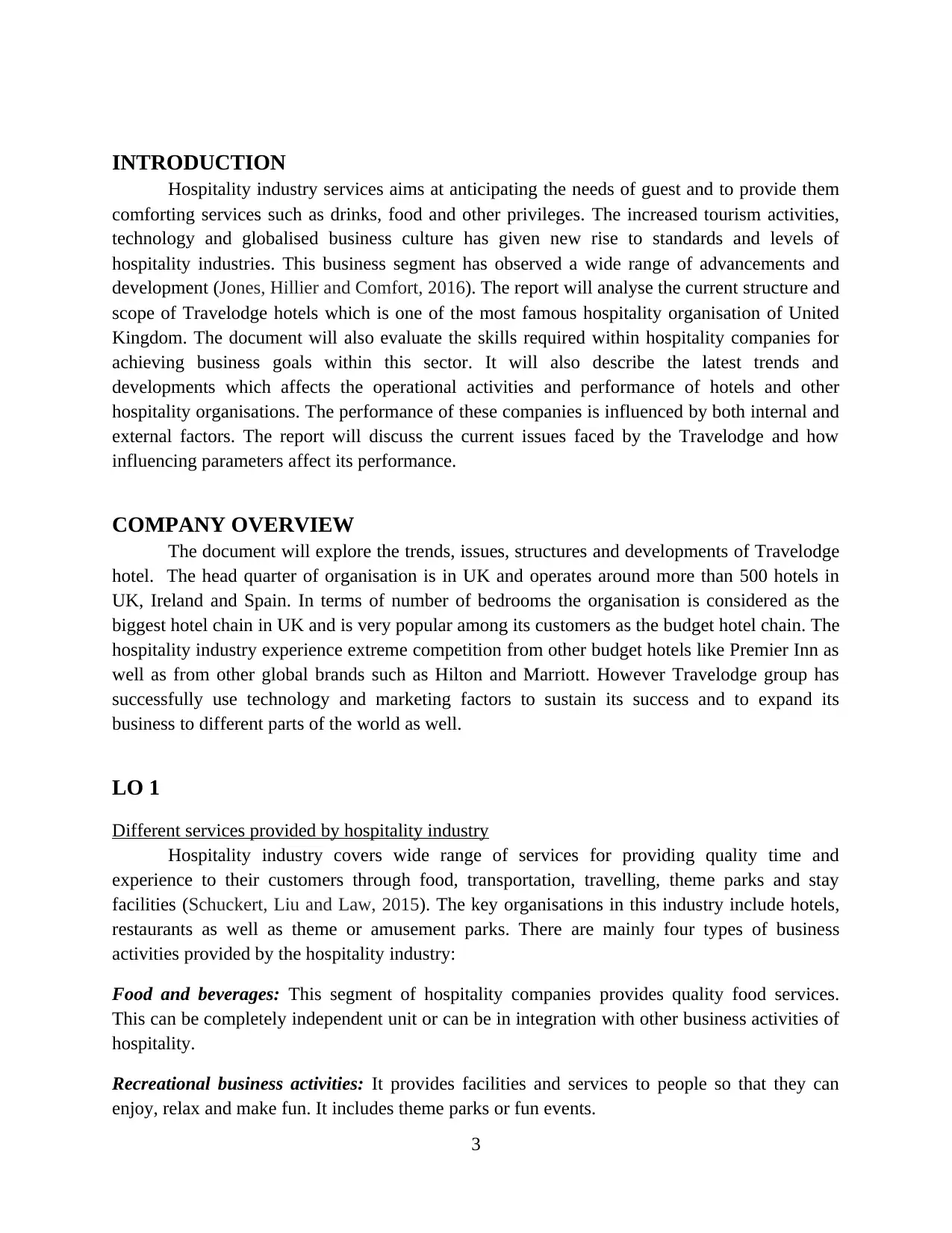
INTRODUCTION
Hospitality industry services aims at anticipating the needs of guest and to provide them
comforting services such as drinks, food and other privileges. The increased tourism activities,
technology and globalised business culture has given new rise to standards and levels of
hospitality industries. This business segment has observed a wide range of advancements and
development (Jones, Hillier and Comfort, 2016). The report will analyse the current structure and
scope of Travelodge hotels which is one of the most famous hospitality organisation of United
Kingdom. The document will also evaluate the skills required within hospitality companies for
achieving business goals within this sector. It will also describe the latest trends and
developments which affects the operational activities and performance of hotels and other
hospitality organisations. The performance of these companies is influenced by both internal and
external factors. The report will discuss the current issues faced by the Travelodge and how
influencing parameters affect its performance.
COMPANY OVERVIEW
The document will explore the trends, issues, structures and developments of Travelodge
hotel. The head quarter of organisation is in UK and operates around more than 500 hotels in
UK, Ireland and Spain. In terms of number of bedrooms the organisation is considered as the
biggest hotel chain in UK and is very popular among its customers as the budget hotel chain. The
hospitality industry experience extreme competition from other budget hotels like Premier Inn as
well as from other global brands such as Hilton and Marriott. However Travelodge group has
successfully use technology and marketing factors to sustain its success and to expand its
business to different parts of the world as well.
LO 1
Different services provided by hospitality industry
Hospitality industry covers wide range of services for providing quality time and
experience to their customers through food, transportation, travelling, theme parks and stay
facilities (Schuckert, Liu and Law, 2015). The key organisations in this industry include hotels,
restaurants as well as theme or amusement parks. There are mainly four types of business
activities provided by the hospitality industry:
Food and beverages: This segment of hospitality companies provides quality food services.
This can be completely independent unit or can be in integration with other business activities of
hospitality.
Recreational business activities: It provides facilities and services to people so that they can
enjoy, relax and make fun. It includes theme parks or fun events.
3
Hospitality industry services aims at anticipating the needs of guest and to provide them
comforting services such as drinks, food and other privileges. The increased tourism activities,
technology and globalised business culture has given new rise to standards and levels of
hospitality industries. This business segment has observed a wide range of advancements and
development (Jones, Hillier and Comfort, 2016). The report will analyse the current structure and
scope of Travelodge hotels which is one of the most famous hospitality organisation of United
Kingdom. The document will also evaluate the skills required within hospitality companies for
achieving business goals within this sector. It will also describe the latest trends and
developments which affects the operational activities and performance of hotels and other
hospitality organisations. The performance of these companies is influenced by both internal and
external factors. The report will discuss the current issues faced by the Travelodge and how
influencing parameters affect its performance.
COMPANY OVERVIEW
The document will explore the trends, issues, structures and developments of Travelodge
hotel. The head quarter of organisation is in UK and operates around more than 500 hotels in
UK, Ireland and Spain. In terms of number of bedrooms the organisation is considered as the
biggest hotel chain in UK and is very popular among its customers as the budget hotel chain. The
hospitality industry experience extreme competition from other budget hotels like Premier Inn as
well as from other global brands such as Hilton and Marriott. However Travelodge group has
successfully use technology and marketing factors to sustain its success and to expand its
business to different parts of the world as well.
LO 1
Different services provided by hospitality industry
Hospitality industry covers wide range of services for providing quality time and
experience to their customers through food, transportation, travelling, theme parks and stay
facilities (Schuckert, Liu and Law, 2015). The key organisations in this industry include hotels,
restaurants as well as theme or amusement parks. There are mainly four types of business
activities provided by the hospitality industry:
Food and beverages: This segment of hospitality companies provides quality food services.
This can be completely independent unit or can be in integration with other business activities of
hospitality.
Recreational business activities: It provides facilities and services to people so that they can
enjoy, relax and make fun. It includes theme parks or fun events.
3
⊘ This is a preview!⊘
Do you want full access?
Subscribe today to unlock all pages.

Trusted by 1+ million students worldwide
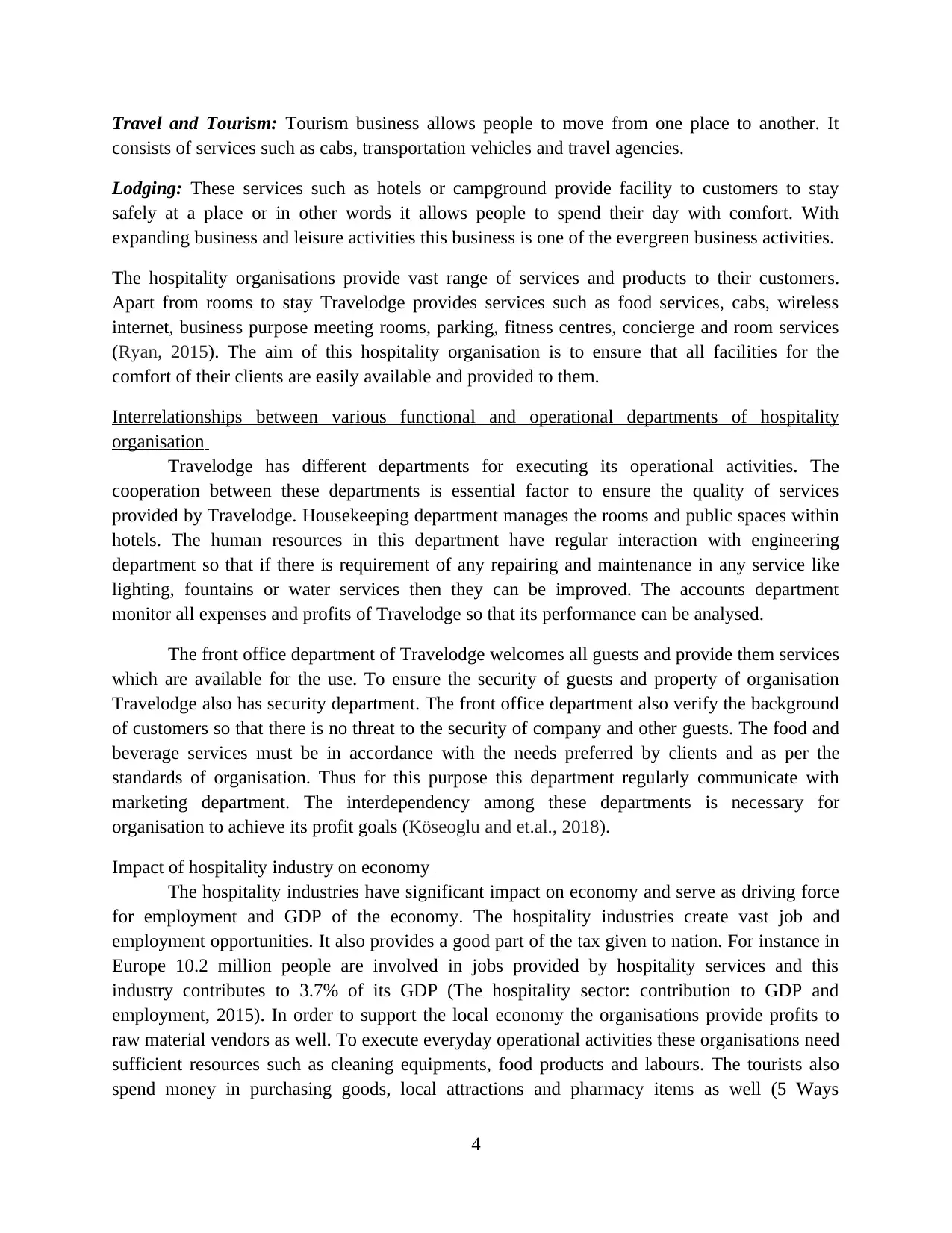
Travel and Tourism: Tourism business allows people to move from one place to another. It
consists of services such as cabs, transportation vehicles and travel agencies.
Lodging: These services such as hotels or campground provide facility to customers to stay
safely at a place or in other words it allows people to spend their day with comfort. With
expanding business and leisure activities this business is one of the evergreen business activities.
The hospitality organisations provide vast range of services and products to their customers.
Apart from rooms to stay Travelodge provides services such as food services, cabs, wireless
internet, business purpose meeting rooms, parking, fitness centres, concierge and room services
(Ryan, 2015). The aim of this hospitality organisation is to ensure that all facilities for the
comfort of their clients are easily available and provided to them.
Interrelationships between various functional and operational departments of hospitality
organisation
Travelodge has different departments for executing its operational activities. The
cooperation between these departments is essential factor to ensure the quality of services
provided by Travelodge. Housekeeping department manages the rooms and public spaces within
hotels. The human resources in this department have regular interaction with engineering
department so that if there is requirement of any repairing and maintenance in any service like
lighting, fountains or water services then they can be improved. The accounts department
monitor all expenses and profits of Travelodge so that its performance can be analysed.
The front office department of Travelodge welcomes all guests and provide them services
which are available for the use. To ensure the security of guests and property of organisation
Travelodge also has security department. The front office department also verify the background
of customers so that there is no threat to the security of company and other guests. The food and
beverage services must be in accordance with the needs preferred by clients and as per the
standards of organisation. Thus for this purpose this department regularly communicate with
marketing department. The interdependency among these departments is necessary for
organisation to achieve its profit goals (Köseoglu and et.al., 2018).
Impact of hospitality industry on economy
The hospitality industries have significant impact on economy and serve as driving force
for employment and GDP of the economy. The hospitality industries create vast job and
employment opportunities. It also provides a good part of the tax given to nation. For instance in
Europe 10.2 million people are involved in jobs provided by hospitality services and this
industry contributes to 3.7% of its GDP (The hospitality sector: contribution to GDP and
employment, 2015). In order to support the local economy the organisations provide profits to
raw material vendors as well. To execute everyday operational activities these organisations need
sufficient resources such as cleaning equipments, food products and labours. The tourists also
spend money in purchasing goods, local attractions and pharmacy items as well (5 Ways
4
consists of services such as cabs, transportation vehicles and travel agencies.
Lodging: These services such as hotels or campground provide facility to customers to stay
safely at a place or in other words it allows people to spend their day with comfort. With
expanding business and leisure activities this business is one of the evergreen business activities.
The hospitality organisations provide vast range of services and products to their customers.
Apart from rooms to stay Travelodge provides services such as food services, cabs, wireless
internet, business purpose meeting rooms, parking, fitness centres, concierge and room services
(Ryan, 2015). The aim of this hospitality organisation is to ensure that all facilities for the
comfort of their clients are easily available and provided to them.
Interrelationships between various functional and operational departments of hospitality
organisation
Travelodge has different departments for executing its operational activities. The
cooperation between these departments is essential factor to ensure the quality of services
provided by Travelodge. Housekeeping department manages the rooms and public spaces within
hotels. The human resources in this department have regular interaction with engineering
department so that if there is requirement of any repairing and maintenance in any service like
lighting, fountains or water services then they can be improved. The accounts department
monitor all expenses and profits of Travelodge so that its performance can be analysed.
The front office department of Travelodge welcomes all guests and provide them services
which are available for the use. To ensure the security of guests and property of organisation
Travelodge also has security department. The front office department also verify the background
of customers so that there is no threat to the security of company and other guests. The food and
beverage services must be in accordance with the needs preferred by clients and as per the
standards of organisation. Thus for this purpose this department regularly communicate with
marketing department. The interdependency among these departments is necessary for
organisation to achieve its profit goals (Köseoglu and et.al., 2018).
Impact of hospitality industry on economy
The hospitality industries have significant impact on economy and serve as driving force
for employment and GDP of the economy. The hospitality industries create vast job and
employment opportunities. It also provides a good part of the tax given to nation. For instance in
Europe 10.2 million people are involved in jobs provided by hospitality services and this
industry contributes to 3.7% of its GDP (The hospitality sector: contribution to GDP and
employment, 2015). In order to support the local economy the organisations provide profits to
raw material vendors as well. To execute everyday operational activities these organisations need
sufficient resources such as cleaning equipments, food products and labours. The tourists also
spend money in purchasing goods, local attractions and pharmacy items as well (5 Ways
4
Paraphrase This Document
Need a fresh take? Get an instant paraphrase of this document with our AI Paraphraser
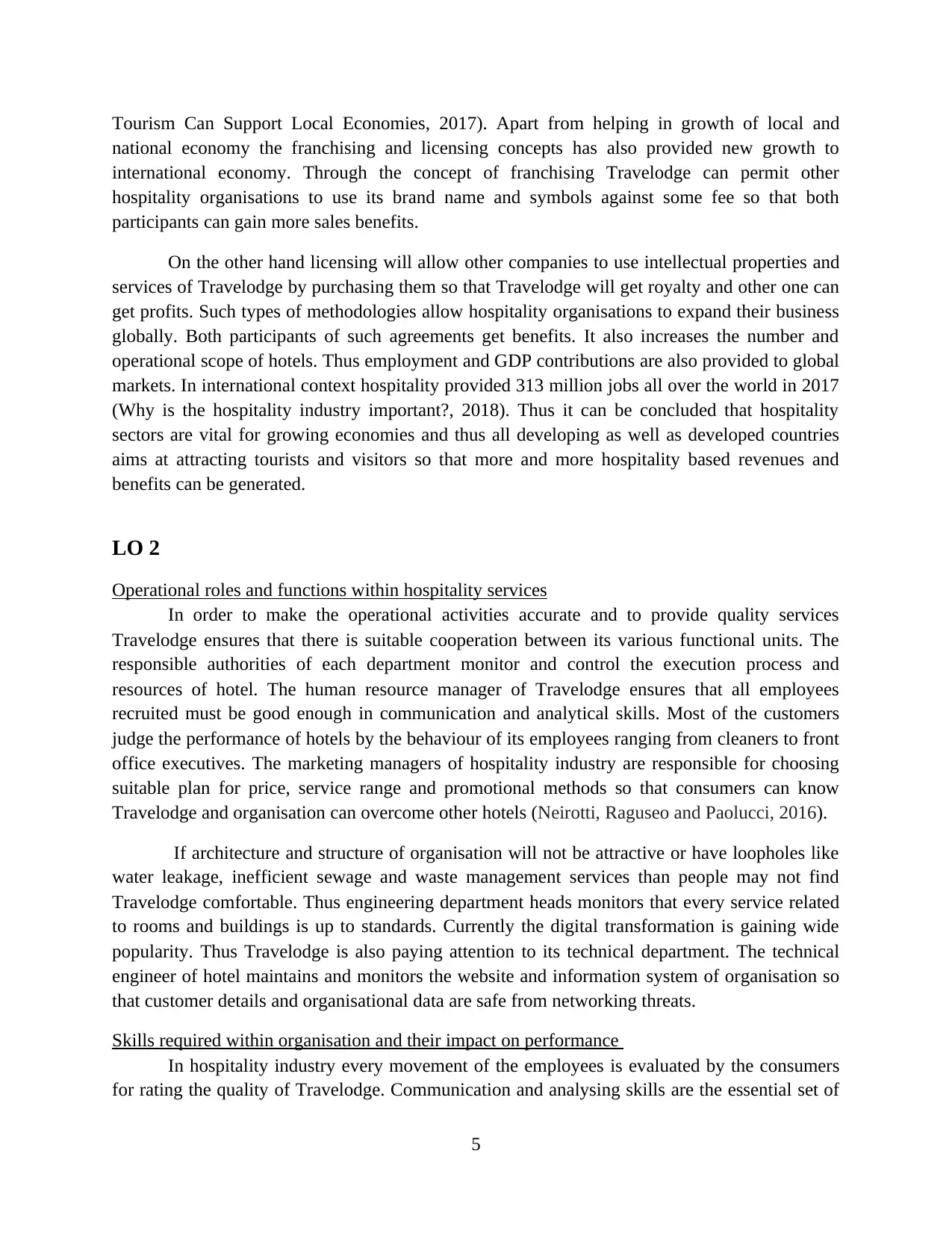
Tourism Can Support Local Economies, 2017). Apart from helping in growth of local and
national economy the franchising and licensing concepts has also provided new growth to
international economy. Through the concept of franchising Travelodge can permit other
hospitality organisations to use its brand name and symbols against some fee so that both
participants can gain more sales benefits.
On the other hand licensing will allow other companies to use intellectual properties and
services of Travelodge by purchasing them so that Travelodge will get royalty and other one can
get profits. Such types of methodologies allow hospitality organisations to expand their business
globally. Both participants of such agreements get benefits. It also increases the number and
operational scope of hotels. Thus employment and GDP contributions are also provided to global
markets. In international context hospitality provided 313 million jobs all over the world in 2017
(Why is the hospitality industry important?, 2018). Thus it can be concluded that hospitality
sectors are vital for growing economies and thus all developing as well as developed countries
aims at attracting tourists and visitors so that more and more hospitality based revenues and
benefits can be generated.
LO 2
Operational roles and functions within hospitality services
In order to make the operational activities accurate and to provide quality services
Travelodge ensures that there is suitable cooperation between its various functional units. The
responsible authorities of each department monitor and control the execution process and
resources of hotel. The human resource manager of Travelodge ensures that all employees
recruited must be good enough in communication and analytical skills. Most of the customers
judge the performance of hotels by the behaviour of its employees ranging from cleaners to front
office executives. The marketing managers of hospitality industry are responsible for choosing
suitable plan for price, service range and promotional methods so that consumers can know
Travelodge and organisation can overcome other hotels (Neirotti, Raguseo and Paolucci, 2016).
If architecture and structure of organisation will not be attractive or have loopholes like
water leakage, inefficient sewage and waste management services than people may not find
Travelodge comfortable. Thus engineering department heads monitors that every service related
to rooms and buildings is up to standards. Currently the digital transformation is gaining wide
popularity. Thus Travelodge is also paying attention to its technical department. The technical
engineer of hotel maintains and monitors the website and information system of organisation so
that customer details and organisational data are safe from networking threats.
Skills required within organisation and their impact on performance
In hospitality industry every movement of the employees is evaluated by the consumers
for rating the quality of Travelodge. Communication and analysing skills are the essential set of
5
national economy the franchising and licensing concepts has also provided new growth to
international economy. Through the concept of franchising Travelodge can permit other
hospitality organisations to use its brand name and symbols against some fee so that both
participants can gain more sales benefits.
On the other hand licensing will allow other companies to use intellectual properties and
services of Travelodge by purchasing them so that Travelodge will get royalty and other one can
get profits. Such types of methodologies allow hospitality organisations to expand their business
globally. Both participants of such agreements get benefits. It also increases the number and
operational scope of hotels. Thus employment and GDP contributions are also provided to global
markets. In international context hospitality provided 313 million jobs all over the world in 2017
(Why is the hospitality industry important?, 2018). Thus it can be concluded that hospitality
sectors are vital for growing economies and thus all developing as well as developed countries
aims at attracting tourists and visitors so that more and more hospitality based revenues and
benefits can be generated.
LO 2
Operational roles and functions within hospitality services
In order to make the operational activities accurate and to provide quality services
Travelodge ensures that there is suitable cooperation between its various functional units. The
responsible authorities of each department monitor and control the execution process and
resources of hotel. The human resource manager of Travelodge ensures that all employees
recruited must be good enough in communication and analytical skills. Most of the customers
judge the performance of hotels by the behaviour of its employees ranging from cleaners to front
office executives. The marketing managers of hospitality industry are responsible for choosing
suitable plan for price, service range and promotional methods so that consumers can know
Travelodge and organisation can overcome other hotels (Neirotti, Raguseo and Paolucci, 2016).
If architecture and structure of organisation will not be attractive or have loopholes like
water leakage, inefficient sewage and waste management services than people may not find
Travelodge comfortable. Thus engineering department heads monitors that every service related
to rooms and buildings is up to standards. Currently the digital transformation is gaining wide
popularity. Thus Travelodge is also paying attention to its technical department. The technical
engineer of hotel maintains and monitors the website and information system of organisation so
that customer details and organisational data are safe from networking threats.
Skills required within organisation and their impact on performance
In hospitality industry every movement of the employees is evaluated by the consumers
for rating the quality of Travelodge. Communication and analysing skills are the essential set of
5
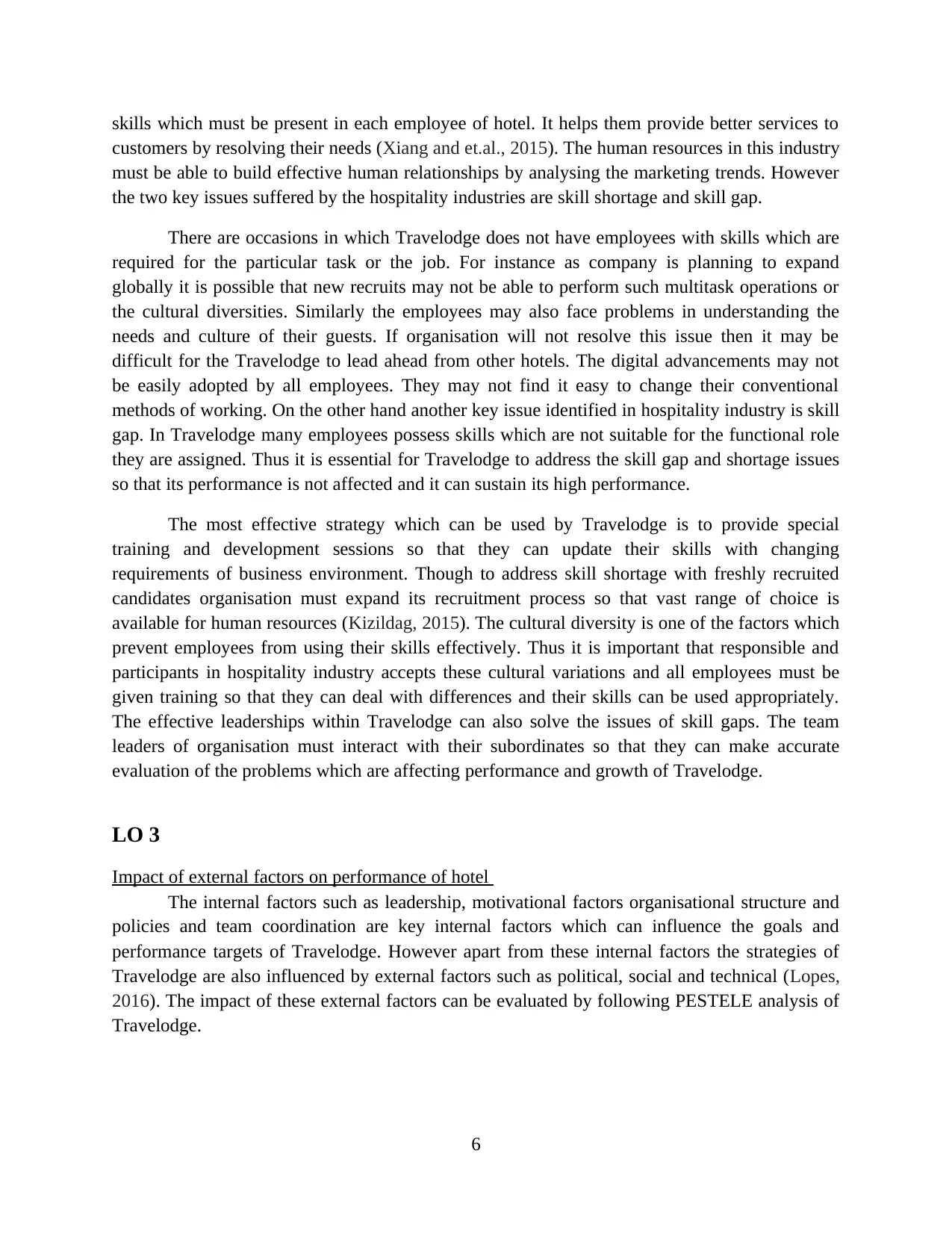
skills which must be present in each employee of hotel. It helps them provide better services to
customers by resolving their needs (Xiang and et.al., 2015). The human resources in this industry
must be able to build effective human relationships by analysing the marketing trends. However
the two key issues suffered by the hospitality industries are skill shortage and skill gap.
There are occasions in which Travelodge does not have employees with skills which are
required for the particular task or the job. For instance as company is planning to expand
globally it is possible that new recruits may not be able to perform such multitask operations or
the cultural diversities. Similarly the employees may also face problems in understanding the
needs and culture of their guests. If organisation will not resolve this issue then it may be
difficult for the Travelodge to lead ahead from other hotels. The digital advancements may not
be easily adopted by all employees. They may not find it easy to change their conventional
methods of working. On the other hand another key issue identified in hospitality industry is skill
gap. In Travelodge many employees possess skills which are not suitable for the functional role
they are assigned. Thus it is essential for Travelodge to address the skill gap and shortage issues
so that its performance is not affected and it can sustain its high performance.
The most effective strategy which can be used by Travelodge is to provide special
training and development sessions so that they can update their skills with changing
requirements of business environment. Though to address skill shortage with freshly recruited
candidates organisation must expand its recruitment process so that vast range of choice is
available for human resources (Kizildag, 2015). The cultural diversity is one of the factors which
prevent employees from using their skills effectively. Thus it is important that responsible and
participants in hospitality industry accepts these cultural variations and all employees must be
given training so that they can deal with differences and their skills can be used appropriately.
The effective leaderships within Travelodge can also solve the issues of skill gaps. The team
leaders of organisation must interact with their subordinates so that they can make accurate
evaluation of the problems which are affecting performance and growth of Travelodge.
LO 3
Impact of external factors on performance of hotel
The internal factors such as leadership, motivational factors organisational structure and
policies and team coordination are key internal factors which can influence the goals and
performance targets of Travelodge. However apart from these internal factors the strategies of
Travelodge are also influenced by external factors such as political, social and technical (Lopes,
2016). The impact of these external factors can be evaluated by following PESTELE analysis of
Travelodge.
6
customers by resolving their needs (Xiang and et.al., 2015). The human resources in this industry
must be able to build effective human relationships by analysing the marketing trends. However
the two key issues suffered by the hospitality industries are skill shortage and skill gap.
There are occasions in which Travelodge does not have employees with skills which are
required for the particular task or the job. For instance as company is planning to expand
globally it is possible that new recruits may not be able to perform such multitask operations or
the cultural diversities. Similarly the employees may also face problems in understanding the
needs and culture of their guests. If organisation will not resolve this issue then it may be
difficult for the Travelodge to lead ahead from other hotels. The digital advancements may not
be easily adopted by all employees. They may not find it easy to change their conventional
methods of working. On the other hand another key issue identified in hospitality industry is skill
gap. In Travelodge many employees possess skills which are not suitable for the functional role
they are assigned. Thus it is essential for Travelodge to address the skill gap and shortage issues
so that its performance is not affected and it can sustain its high performance.
The most effective strategy which can be used by Travelodge is to provide special
training and development sessions so that they can update their skills with changing
requirements of business environment. Though to address skill shortage with freshly recruited
candidates organisation must expand its recruitment process so that vast range of choice is
available for human resources (Kizildag, 2015). The cultural diversity is one of the factors which
prevent employees from using their skills effectively. Thus it is important that responsible and
participants in hospitality industry accepts these cultural variations and all employees must be
given training so that they can deal with differences and their skills can be used appropriately.
The effective leaderships within Travelodge can also solve the issues of skill gaps. The team
leaders of organisation must interact with their subordinates so that they can make accurate
evaluation of the problems which are affecting performance and growth of Travelodge.
LO 3
Impact of external factors on performance of hotel
The internal factors such as leadership, motivational factors organisational structure and
policies and team coordination are key internal factors which can influence the goals and
performance targets of Travelodge. However apart from these internal factors the strategies of
Travelodge are also influenced by external factors such as political, social and technical (Lopes,
2016). The impact of these external factors can be evaluated by following PESTELE analysis of
Travelodge.
6
⊘ This is a preview!⊘
Do you want full access?
Subscribe today to unlock all pages.

Trusted by 1+ million students worldwide
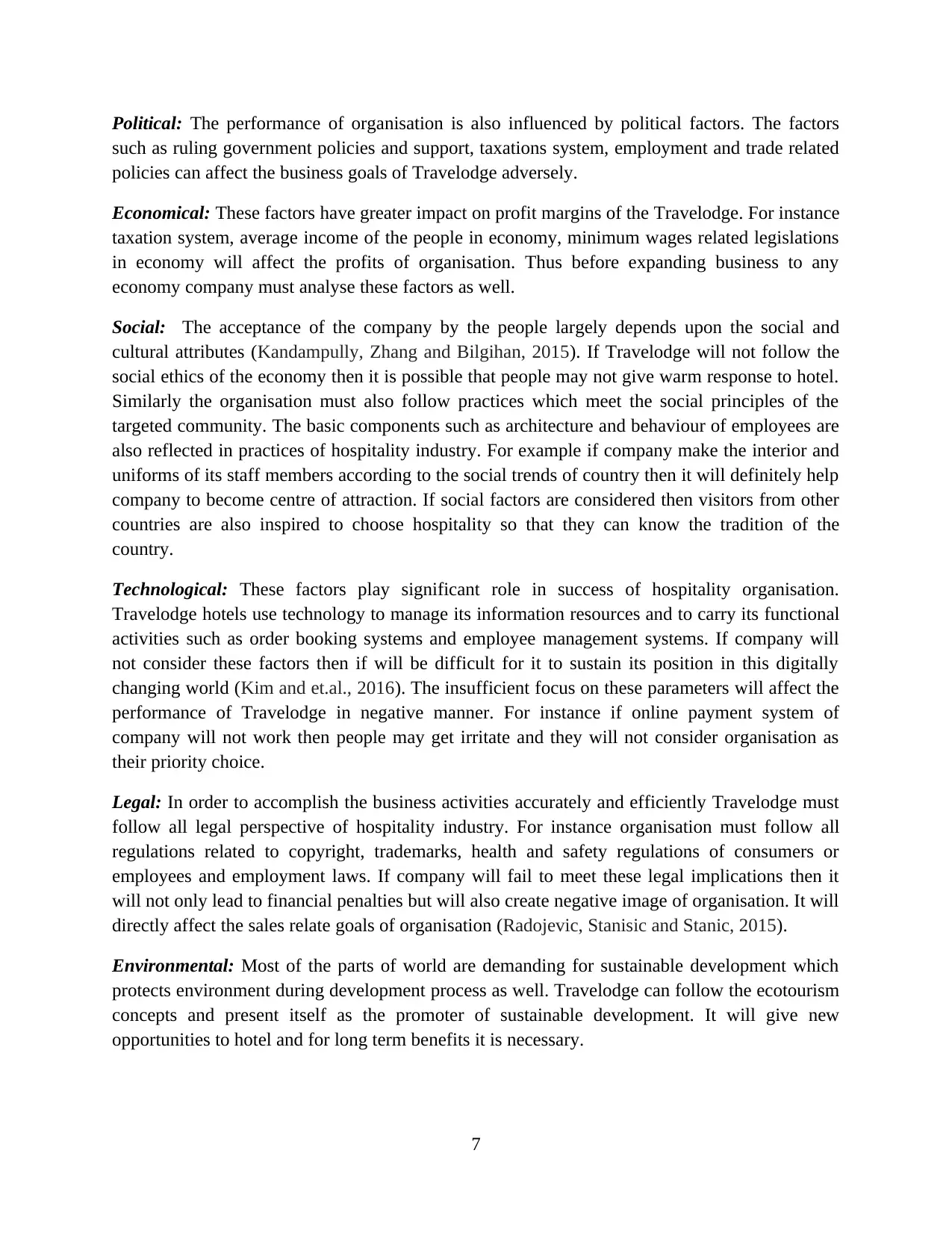
Political: The performance of organisation is also influenced by political factors. The factors
such as ruling government policies and support, taxations system, employment and trade related
policies can affect the business goals of Travelodge adversely.
Economical: These factors have greater impact on profit margins of the Travelodge. For instance
taxation system, average income of the people in economy, minimum wages related legislations
in economy will affect the profits of organisation. Thus before expanding business to any
economy company must analyse these factors as well.
Social: The acceptance of the company by the people largely depends upon the social and
cultural attributes (Kandampully, Zhang and Bilgihan, 2015). If Travelodge will not follow the
social ethics of the economy then it is possible that people may not give warm response to hotel.
Similarly the organisation must also follow practices which meet the social principles of the
targeted community. The basic components such as architecture and behaviour of employees are
also reflected in practices of hospitality industry. For example if company make the interior and
uniforms of its staff members according to the social trends of country then it will definitely help
company to become centre of attraction. If social factors are considered then visitors from other
countries are also inspired to choose hospitality so that they can know the tradition of the
country.
Technological: These factors play significant role in success of hospitality organisation.
Travelodge hotels use technology to manage its information resources and to carry its functional
activities such as order booking systems and employee management systems. If company will
not consider these factors then if will be difficult for it to sustain its position in this digitally
changing world (Kim and et.al., 2016). The insufficient focus on these parameters will affect the
performance of Travelodge in negative manner. For instance if online payment system of
company will not work then people may get irritate and they will not consider organisation as
their priority choice.
Legal: In order to accomplish the business activities accurately and efficiently Travelodge must
follow all legal perspective of hospitality industry. For instance organisation must follow all
regulations related to copyright, trademarks, health and safety regulations of consumers or
employees and employment laws. If company will fail to meet these legal implications then it
will not only lead to financial penalties but will also create negative image of organisation. It will
directly affect the sales relate goals of organisation (Radojevic, Stanisic and Stanic, 2015).
Environmental: Most of the parts of world are demanding for sustainable development which
protects environment during development process as well. Travelodge can follow the ecotourism
concepts and present itself as the promoter of sustainable development. It will give new
opportunities to hotel and for long term benefits it is necessary.
7
such as ruling government policies and support, taxations system, employment and trade related
policies can affect the business goals of Travelodge adversely.
Economical: These factors have greater impact on profit margins of the Travelodge. For instance
taxation system, average income of the people in economy, minimum wages related legislations
in economy will affect the profits of organisation. Thus before expanding business to any
economy company must analyse these factors as well.
Social: The acceptance of the company by the people largely depends upon the social and
cultural attributes (Kandampully, Zhang and Bilgihan, 2015). If Travelodge will not follow the
social ethics of the economy then it is possible that people may not give warm response to hotel.
Similarly the organisation must also follow practices which meet the social principles of the
targeted community. The basic components such as architecture and behaviour of employees are
also reflected in practices of hospitality industry. For example if company make the interior and
uniforms of its staff members according to the social trends of country then it will definitely help
company to become centre of attraction. If social factors are considered then visitors from other
countries are also inspired to choose hospitality so that they can know the tradition of the
country.
Technological: These factors play significant role in success of hospitality organisation.
Travelodge hotels use technology to manage its information resources and to carry its functional
activities such as order booking systems and employee management systems. If company will
not consider these factors then if will be difficult for it to sustain its position in this digitally
changing world (Kim and et.al., 2016). The insufficient focus on these parameters will affect the
performance of Travelodge in negative manner. For instance if online payment system of
company will not work then people may get irritate and they will not consider organisation as
their priority choice.
Legal: In order to accomplish the business activities accurately and efficiently Travelodge must
follow all legal perspective of hospitality industry. For instance organisation must follow all
regulations related to copyright, trademarks, health and safety regulations of consumers or
employees and employment laws. If company will fail to meet these legal implications then it
will not only lead to financial penalties but will also create negative image of organisation. It will
directly affect the sales relate goals of organisation (Radojevic, Stanisic and Stanic, 2015).
Environmental: Most of the parts of world are demanding for sustainable development which
protects environment during development process as well. Travelodge can follow the ecotourism
concepts and present itself as the promoter of sustainable development. It will give new
opportunities to hotel and for long term benefits it is necessary.
7
Paraphrase This Document
Need a fresh take? Get an instant paraphrase of this document with our AI Paraphraser
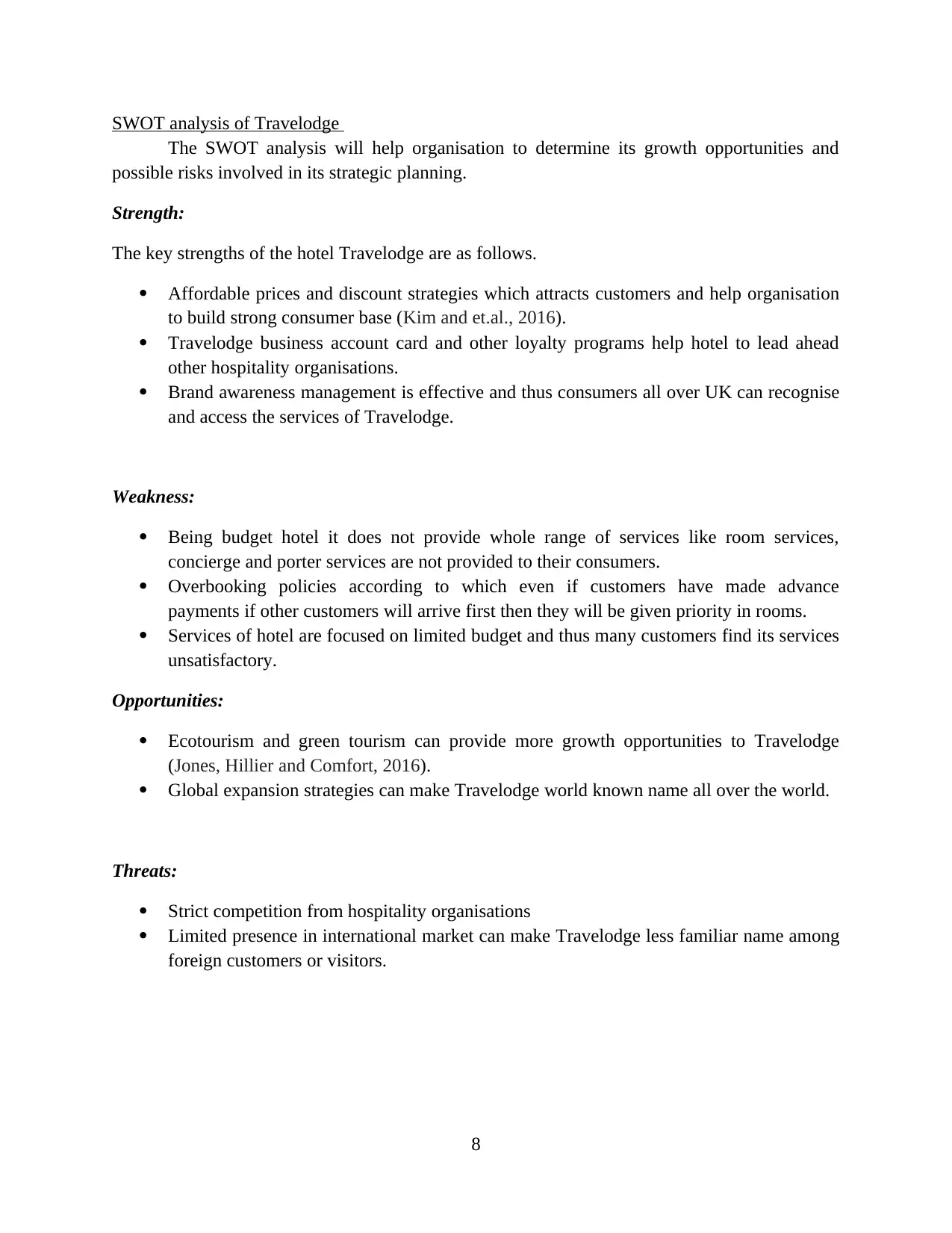
SWOT analysis of Travelodge
The SWOT analysis will help organisation to determine its growth opportunities and
possible risks involved in its strategic planning.
Strength:
The key strengths of the hotel Travelodge are as follows.
Affordable prices and discount strategies which attracts customers and help organisation
to build strong consumer base (Kim and et.al., 2016).
Travelodge business account card and other loyalty programs help hotel to lead ahead
other hospitality organisations.
Brand awareness management is effective and thus consumers all over UK can recognise
and access the services of Travelodge.
Weakness:
Being budget hotel it does not provide whole range of services like room services,
concierge and porter services are not provided to their consumers.
Overbooking policies according to which even if customers have made advance
payments if other customers will arrive first then they will be given priority in rooms.
Services of hotel are focused on limited budget and thus many customers find its services
unsatisfactory.
Opportunities:
Ecotourism and green tourism can provide more growth opportunities to Travelodge
(Jones, Hillier and Comfort, 2016).
Global expansion strategies can make Travelodge world known name all over the world.
Threats:
Strict competition from hospitality organisations
Limited presence in international market can make Travelodge less familiar name among
foreign customers or visitors.
8
The SWOT analysis will help organisation to determine its growth opportunities and
possible risks involved in its strategic planning.
Strength:
The key strengths of the hotel Travelodge are as follows.
Affordable prices and discount strategies which attracts customers and help organisation
to build strong consumer base (Kim and et.al., 2016).
Travelodge business account card and other loyalty programs help hotel to lead ahead
other hospitality organisations.
Brand awareness management is effective and thus consumers all over UK can recognise
and access the services of Travelodge.
Weakness:
Being budget hotel it does not provide whole range of services like room services,
concierge and porter services are not provided to their consumers.
Overbooking policies according to which even if customers have made advance
payments if other customers will arrive first then they will be given priority in rooms.
Services of hotel are focused on limited budget and thus many customers find its services
unsatisfactory.
Opportunities:
Ecotourism and green tourism can provide more growth opportunities to Travelodge
(Jones, Hillier and Comfort, 2016).
Global expansion strategies can make Travelodge world known name all over the world.
Threats:
Strict competition from hospitality organisations
Limited presence in international market can make Travelodge less familiar name among
foreign customers or visitors.
8
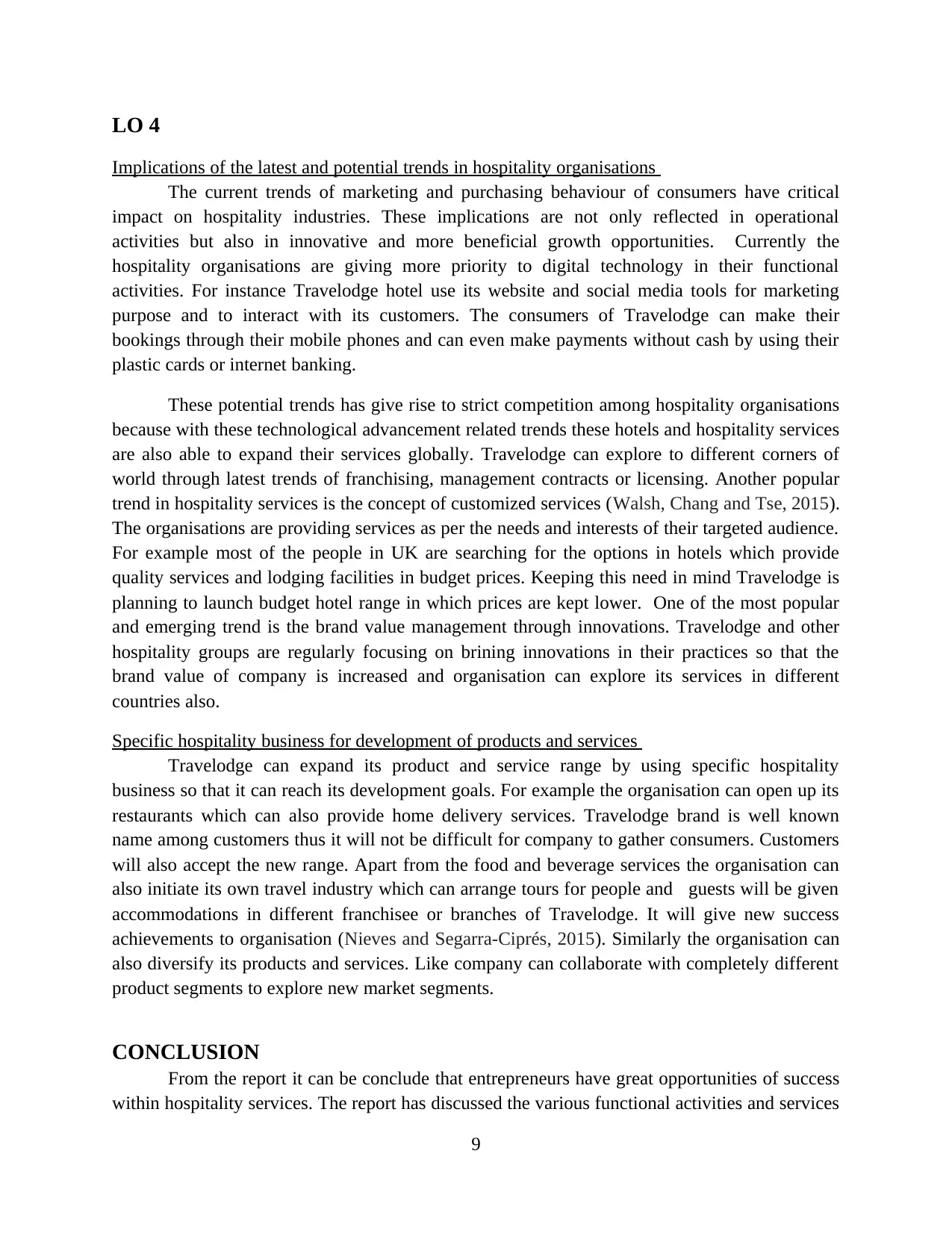
LO 4
Implications of the latest and potential trends in hospitality organisations
The current trends of marketing and purchasing behaviour of consumers have critical
impact on hospitality industries. These implications are not only reflected in operational
activities but also in innovative and more beneficial growth opportunities. Currently the
hospitality organisations are giving more priority to digital technology in their functional
activities. For instance Travelodge hotel use its website and social media tools for marketing
purpose and to interact with its customers. The consumers of Travelodge can make their
bookings through their mobile phones and can even make payments without cash by using their
plastic cards or internet banking.
These potential trends has give rise to strict competition among hospitality organisations
because with these technological advancement related trends these hotels and hospitality services
are also able to expand their services globally. Travelodge can explore to different corners of
world through latest trends of franchising, management contracts or licensing. Another popular
trend in hospitality services is the concept of customized services (Walsh, Chang and Tse, 2015).
The organisations are providing services as per the needs and interests of their targeted audience.
For example most of the people in UK are searching for the options in hotels which provide
quality services and lodging facilities in budget prices. Keeping this need in mind Travelodge is
planning to launch budget hotel range in which prices are kept lower. One of the most popular
and emerging trend is the brand value management through innovations. Travelodge and other
hospitality groups are regularly focusing on brining innovations in their practices so that the
brand value of company is increased and organisation can explore its services in different
countries also.
Specific hospitality business for development of products and services
Travelodge can expand its product and service range by using specific hospitality
business so that it can reach its development goals. For example the organisation can open up its
restaurants which can also provide home delivery services. Travelodge brand is well known
name among customers thus it will not be difficult for company to gather consumers. Customers
will also accept the new range. Apart from the food and beverage services the organisation can
also initiate its own travel industry which can arrange tours for people and guests will be given
accommodations in different franchisee or branches of Travelodge. It will give new success
achievements to organisation (Nieves and Segarra-Ciprés, 2015). Similarly the organisation can
also diversify its products and services. Like company can collaborate with completely different
product segments to explore new market segments.
CONCLUSION
From the report it can be conclude that entrepreneurs have great opportunities of success
within hospitality services. The report has discussed the various functional activities and services
9
Implications of the latest and potential trends in hospitality organisations
The current trends of marketing and purchasing behaviour of consumers have critical
impact on hospitality industries. These implications are not only reflected in operational
activities but also in innovative and more beneficial growth opportunities. Currently the
hospitality organisations are giving more priority to digital technology in their functional
activities. For instance Travelodge hotel use its website and social media tools for marketing
purpose and to interact with its customers. The consumers of Travelodge can make their
bookings through their mobile phones and can even make payments without cash by using their
plastic cards or internet banking.
These potential trends has give rise to strict competition among hospitality organisations
because with these technological advancement related trends these hotels and hospitality services
are also able to expand their services globally. Travelodge can explore to different corners of
world through latest trends of franchising, management contracts or licensing. Another popular
trend in hospitality services is the concept of customized services (Walsh, Chang and Tse, 2015).
The organisations are providing services as per the needs and interests of their targeted audience.
For example most of the people in UK are searching for the options in hotels which provide
quality services and lodging facilities in budget prices. Keeping this need in mind Travelodge is
planning to launch budget hotel range in which prices are kept lower. One of the most popular
and emerging trend is the brand value management through innovations. Travelodge and other
hospitality groups are regularly focusing on brining innovations in their practices so that the
brand value of company is increased and organisation can explore its services in different
countries also.
Specific hospitality business for development of products and services
Travelodge can expand its product and service range by using specific hospitality
business so that it can reach its development goals. For example the organisation can open up its
restaurants which can also provide home delivery services. Travelodge brand is well known
name among customers thus it will not be difficult for company to gather consumers. Customers
will also accept the new range. Apart from the food and beverage services the organisation can
also initiate its own travel industry which can arrange tours for people and guests will be given
accommodations in different franchisee or branches of Travelodge. It will give new success
achievements to organisation (Nieves and Segarra-Ciprés, 2015). Similarly the organisation can
also diversify its products and services. Like company can collaborate with completely different
product segments to explore new market segments.
CONCLUSION
From the report it can be conclude that entrepreneurs have great opportunities of success
within hospitality services. The report has discussed the various functional activities and services
9
⊘ This is a preview!⊘
Do you want full access?
Subscribe today to unlock all pages.

Trusted by 1+ million students worldwide
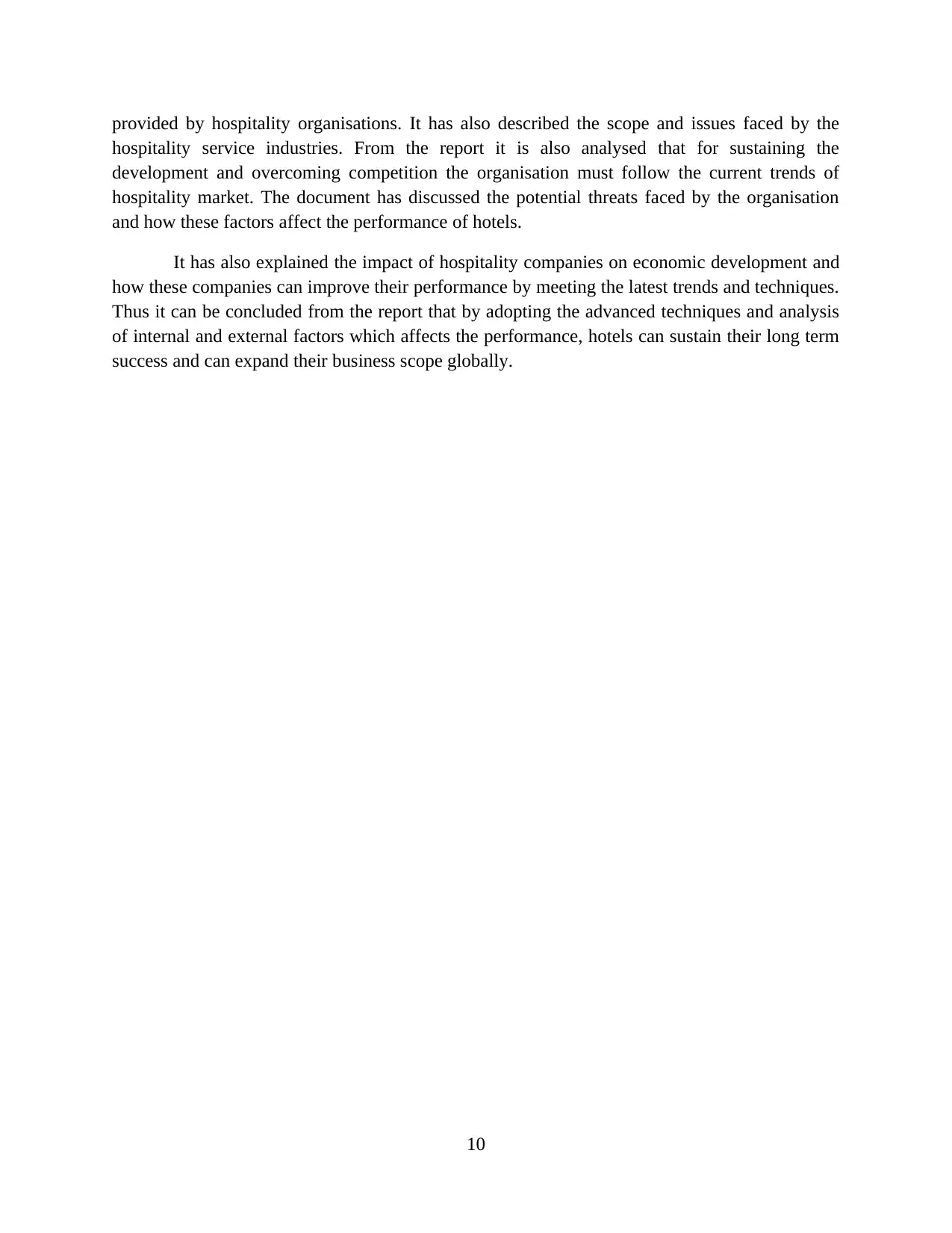
provided by hospitality organisations. It has also described the scope and issues faced by the
hospitality service industries. From the report it is also analysed that for sustaining the
development and overcoming competition the organisation must follow the current trends of
hospitality market. The document has discussed the potential threats faced by the organisation
and how these factors affect the performance of hotels.
It has also explained the impact of hospitality companies on economic development and
how these companies can improve their performance by meeting the latest trends and techniques.
Thus it can be concluded from the report that by adopting the advanced techniques and analysis
of internal and external factors which affects the performance, hotels can sustain their long term
success and can expand their business scope globally.
10
hospitality service industries. From the report it is also analysed that for sustaining the
development and overcoming competition the organisation must follow the current trends of
hospitality market. The document has discussed the potential threats faced by the organisation
and how these factors affect the performance of hotels.
It has also explained the impact of hospitality companies on economic development and
how these companies can improve their performance by meeting the latest trends and techniques.
Thus it can be concluded from the report that by adopting the advanced techniques and analysis
of internal and external factors which affects the performance, hotels can sustain their long term
success and can expand their business scope globally.
10
Paraphrase This Document
Need a fresh take? Get an instant paraphrase of this document with our AI Paraphraser
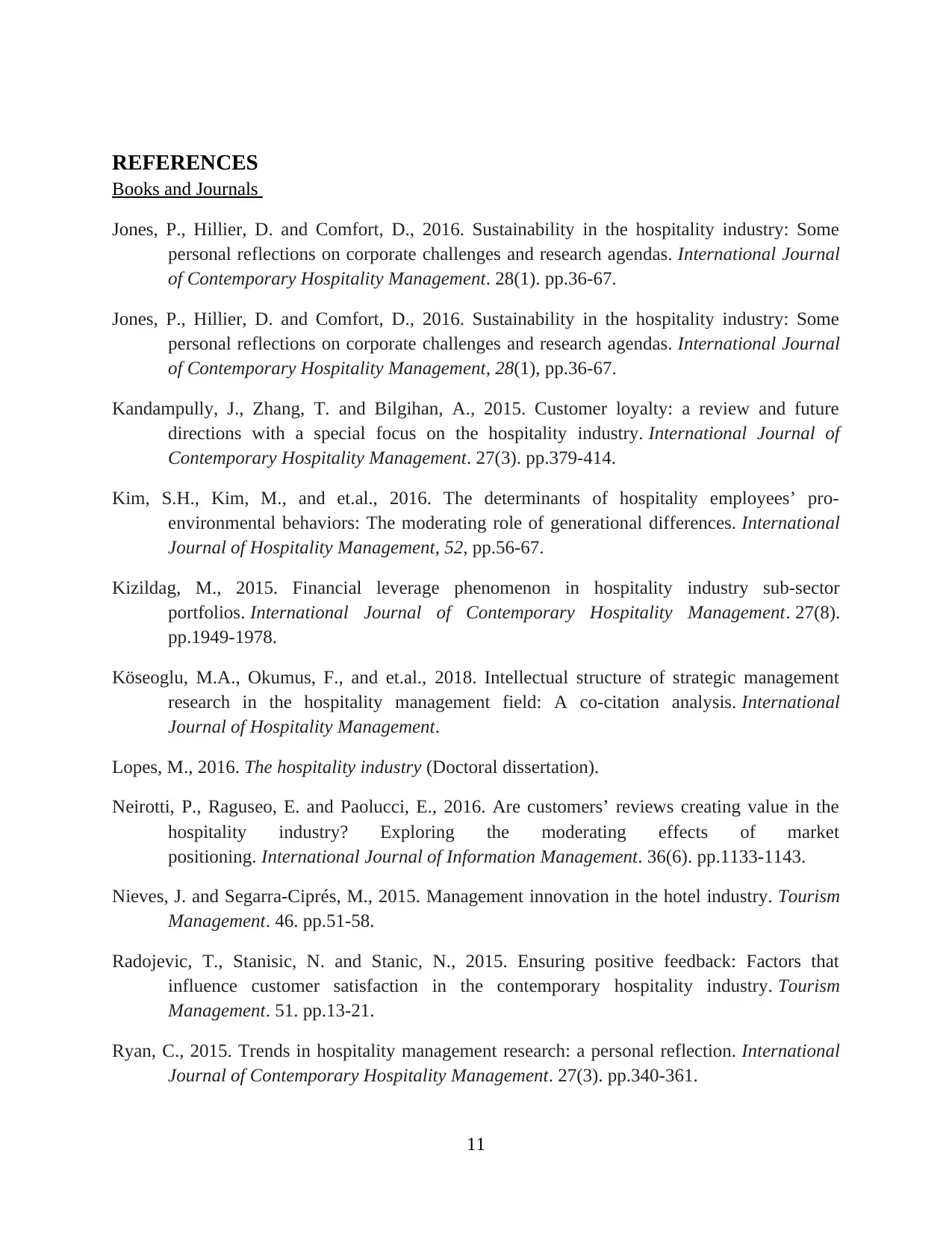
REFERENCES
Books and Journals
Jones, P., Hillier, D. and Comfort, D., 2016. Sustainability in the hospitality industry: Some
personal reflections on corporate challenges and research agendas. International Journal
of Contemporary Hospitality Management. 28(1). pp.36-67.
Jones, P., Hillier, D. and Comfort, D., 2016. Sustainability in the hospitality industry: Some
personal reflections on corporate challenges and research agendas. International Journal
of Contemporary Hospitality Management, 28(1), pp.36-67.
Kandampully, J., Zhang, T. and Bilgihan, A., 2015. Customer loyalty: a review and future
directions with a special focus on the hospitality industry. International Journal of
Contemporary Hospitality Management. 27(3). pp.379-414.
Kim, S.H., Kim, M., and et.al., 2016. The determinants of hospitality employees’ pro-
environmental behaviors: The moderating role of generational differences. International
Journal of Hospitality Management, 52, pp.56-67.
Kizildag, M., 2015. Financial leverage phenomenon in hospitality industry sub-sector
portfolios. International Journal of Contemporary Hospitality Management. 27(8).
pp.1949-1978.
Köseoglu, M.A., Okumus, F., and et.al., 2018. Intellectual structure of strategic management
research in the hospitality management field: A co-citation analysis. International
Journal of Hospitality Management.
Lopes, M., 2016. The hospitality industry (Doctoral dissertation).
Neirotti, P., Raguseo, E. and Paolucci, E., 2016. Are customers’ reviews creating value in the
hospitality industry? Exploring the moderating effects of market
positioning. International Journal of Information Management. 36(6). pp.1133-1143.
Nieves, J. and Segarra-Ciprés, M., 2015. Management innovation in the hotel industry. Tourism
Management. 46. pp.51-58.
Radojevic, T., Stanisic, N. and Stanic, N., 2015. Ensuring positive feedback: Factors that
influence customer satisfaction in the contemporary hospitality industry. Tourism
Management. 51. pp.13-21.
Ryan, C., 2015. Trends in hospitality management research: a personal reflection. International
Journal of Contemporary Hospitality Management. 27(3). pp.340-361.
11
Books and Journals
Jones, P., Hillier, D. and Comfort, D., 2016. Sustainability in the hospitality industry: Some
personal reflections on corporate challenges and research agendas. International Journal
of Contemporary Hospitality Management. 28(1). pp.36-67.
Jones, P., Hillier, D. and Comfort, D., 2016. Sustainability in the hospitality industry: Some
personal reflections on corporate challenges and research agendas. International Journal
of Contemporary Hospitality Management, 28(1), pp.36-67.
Kandampully, J., Zhang, T. and Bilgihan, A., 2015. Customer loyalty: a review and future
directions with a special focus on the hospitality industry. International Journal of
Contemporary Hospitality Management. 27(3). pp.379-414.
Kim, S.H., Kim, M., and et.al., 2016. The determinants of hospitality employees’ pro-
environmental behaviors: The moderating role of generational differences. International
Journal of Hospitality Management, 52, pp.56-67.
Kizildag, M., 2015. Financial leverage phenomenon in hospitality industry sub-sector
portfolios. International Journal of Contemporary Hospitality Management. 27(8).
pp.1949-1978.
Köseoglu, M.A., Okumus, F., and et.al., 2018. Intellectual structure of strategic management
research in the hospitality management field: A co-citation analysis. International
Journal of Hospitality Management.
Lopes, M., 2016. The hospitality industry (Doctoral dissertation).
Neirotti, P., Raguseo, E. and Paolucci, E., 2016. Are customers’ reviews creating value in the
hospitality industry? Exploring the moderating effects of market
positioning. International Journal of Information Management. 36(6). pp.1133-1143.
Nieves, J. and Segarra-Ciprés, M., 2015. Management innovation in the hotel industry. Tourism
Management. 46. pp.51-58.
Radojevic, T., Stanisic, N. and Stanic, N., 2015. Ensuring positive feedback: Factors that
influence customer satisfaction in the contemporary hospitality industry. Tourism
Management. 51. pp.13-21.
Ryan, C., 2015. Trends in hospitality management research: a personal reflection. International
Journal of Contemporary Hospitality Management. 27(3). pp.340-361.
11
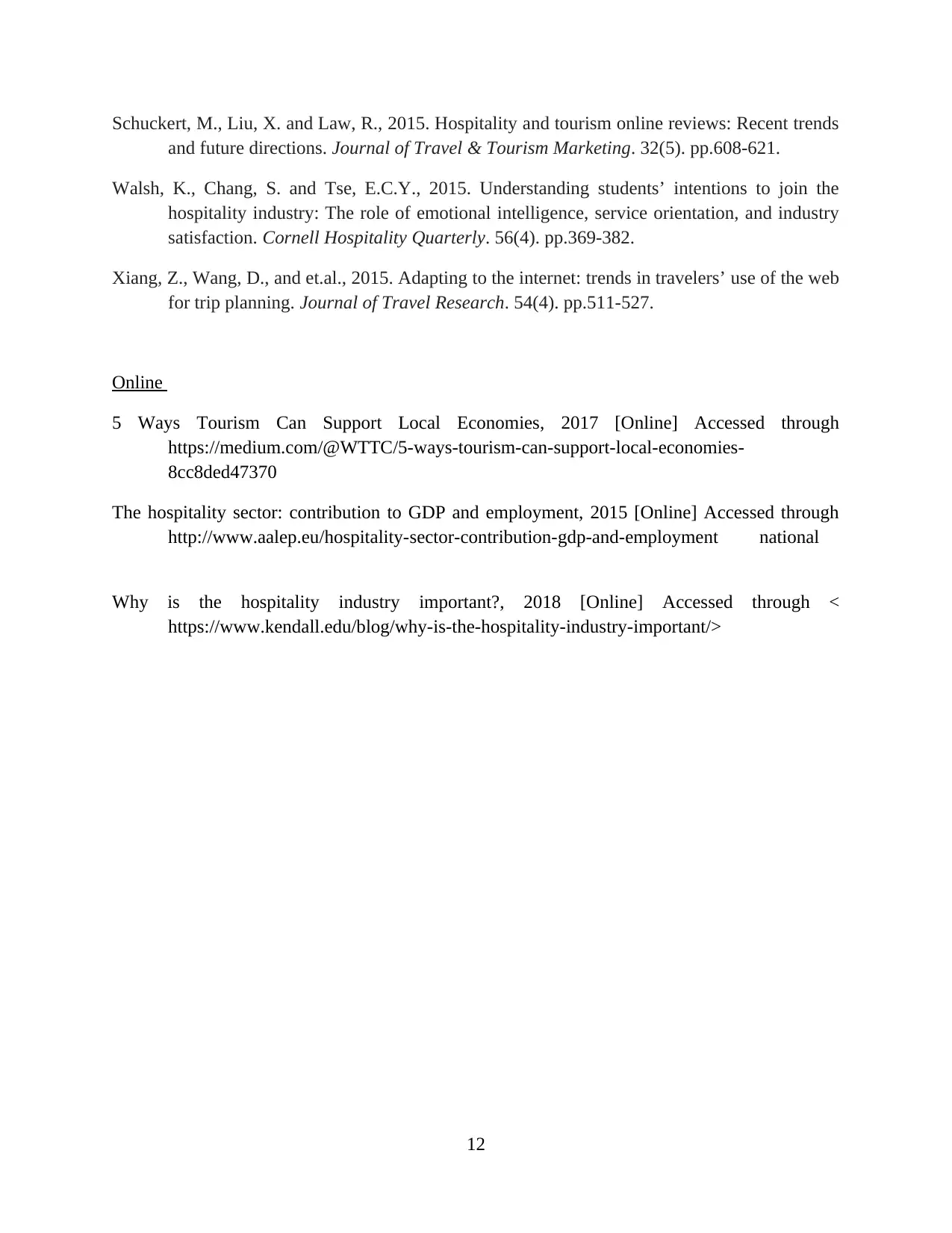
Schuckert, M., Liu, X. and Law, R., 2015. Hospitality and tourism online reviews: Recent trends
and future directions. Journal of Travel & Tourism Marketing. 32(5). pp.608-621.
Walsh, K., Chang, S. and Tse, E.C.Y., 2015. Understanding students’ intentions to join the
hospitality industry: The role of emotional intelligence, service orientation, and industry
satisfaction. Cornell Hospitality Quarterly. 56(4). pp.369-382.
Xiang, Z., Wang, D., and et.al., 2015. Adapting to the internet: trends in travelers’ use of the web
for trip planning. Journal of Travel Research. 54(4). pp.511-527.
Online
5 Ways Tourism Can Support Local Economies, 2017 [Online] Accessed through
https://medium.com/@WTTC/5-ways-tourism-can-support-local-economies-
8cc8ded47370
The hospitality sector: contribution to GDP and employment, 2015 [Online] Accessed through
http://www.aalep.eu/hospitality-sector-contribution-gdp-and-employment national
Why is the hospitality industry important?, 2018 [Online] Accessed through <
https://www.kendall.edu/blog/why-is-the-hospitality-industry-important/>
12
and future directions. Journal of Travel & Tourism Marketing. 32(5). pp.608-621.
Walsh, K., Chang, S. and Tse, E.C.Y., 2015. Understanding students’ intentions to join the
hospitality industry: The role of emotional intelligence, service orientation, and industry
satisfaction. Cornell Hospitality Quarterly. 56(4). pp.369-382.
Xiang, Z., Wang, D., and et.al., 2015. Adapting to the internet: trends in travelers’ use of the web
for trip planning. Journal of Travel Research. 54(4). pp.511-527.
Online
5 Ways Tourism Can Support Local Economies, 2017 [Online] Accessed through
https://medium.com/@WTTC/5-ways-tourism-can-support-local-economies-
8cc8ded47370
The hospitality sector: contribution to GDP and employment, 2015 [Online] Accessed through
http://www.aalep.eu/hospitality-sector-contribution-gdp-and-employment national
Why is the hospitality industry important?, 2018 [Online] Accessed through <
https://www.kendall.edu/blog/why-is-the-hospitality-industry-important/>
12
⊘ This is a preview!⊘
Do you want full access?
Subscribe today to unlock all pages.

Trusted by 1+ million students worldwide
1 out of 12
Related Documents
Your All-in-One AI-Powered Toolkit for Academic Success.
+13062052269
info@desklib.com
Available 24*7 on WhatsApp / Email
![[object Object]](/_next/static/media/star-bottom.7253800d.svg)
Unlock your academic potential
Copyright © 2020–2026 A2Z Services. All Rights Reserved. Developed and managed by ZUCOL.





